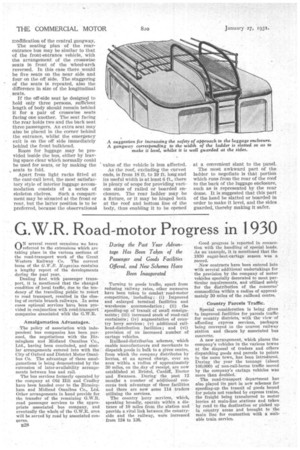G.W.R. Road-motor Progress in 1930
Page 46

If you've noticed an error in this article please click here to report it so we can fix it.
During the Past Year Moantage Has Been Taken of the Passenger and Goods Facilities Offered, and New Schemes Have Been Inaugurated ON several recent occasions we have referred to the extensions which are taking place in the various sections of the road-transport work of the Great Western Railway Co. The current issue of the G.Magazinecontains a lengthy report of the developments during the past year.
Dealing first with passenger transport, it is , mentioned that the changed condition of local traffic, due to the tendency of the travelling public to resort to road transport, resulted in the closing of certain branch railways. In some cases optional services have been provided in conjunction with road-transpirt companies aSsociated with the G.W.R.
Amalgamation Advantages.
The policy of association with independent bus companies has been pursued, the negotiations with the Birmingham and Midland Omnibus "Co., Ltd., having been concluded, and similar arrangements entered into with the City of Oxford and District Motor Omnibus Co. The advantage of these amalgamations is being demonstrated by the extension of inter-availability arrangements between bus and raiL The bus services formerly operated by the company at Old Bill and Cradley have been handed over to the Birmingham and Midland Omnibus Co., Ltd. Other arrangements in hand provide for the transfer of the remaining G.W.R. road passenger services to the appropriate associated bus company, and eventually the whole of the G.W.R. area will be served by road by associated concerns. Turning to goods traffic, apart from reducing railway rates, other measures have been taken to combat road-motor competition, including: (i) Improved and enlarged terminal facilities and warehouse accommodation ; (ii) the speeding-up of transit of small consignments; (iii) increased stock of road-rail containers; (iv) augmentation of country lorry services ; (v) additional railhead-distribution facilities ; and (vi) provision of an increased number of cartage vehicles.
Railhead-distribution schemes, which enable manufacturers and merchants to dispatch goods in bulk to a given centre, from which the company distributes by lorries, at an agreed charge, over an area within a radius of approximately 30 miles, on the day of receipt, are now established at Bristol, Cardiff, Exeter and Swansea. During the past 12 months a number of additional concerns took advantage of these facilities and there are now some 114 traders utilizing the services.
The country lorry services, which, speaking broadly, operate within a distance of 10 miles from the station and provide a vital link between,the countryside and the railway, were increased from 124 to 136.
Good progress is reported in connection with the handling of special loads. As an example_ it is mentioned that the 1030 sugar-beet-cartage season was a record.
New contracts have been entered into with several additional undertakings for the provision by the company of motor vehicles specially decorated to meet particular requirements, and utilized solely for the distribution of the concerns' commodities within a radius of approximately 30 miles of the railhead centre. "
Country Parcels Traffic.
Special consideration is being given to improved facilities for parcels traffic for country districts, with the view of affording express services, packages being conveyed to the nearest railway station and thence by associated bus concerns.
A new arrangement, which places the company's vehicles in the various towns at the disposal of traders and others dispatching goods and parcels to points in the same town, has been introduced. During the year the tonnage (about 100,000) of non-rail-borne traffic moved. by the company's cartage vehicles was more than doubled.
The road-transport department has also played its part in new schemes for speeding-up the transit of goods bound for points not reached by express trains, the freight being transferred to motor lorries at main-line stations and taken by road to the destination or picked up in country areas and brought to the main line for connectiou with a suitable train service.




































































































